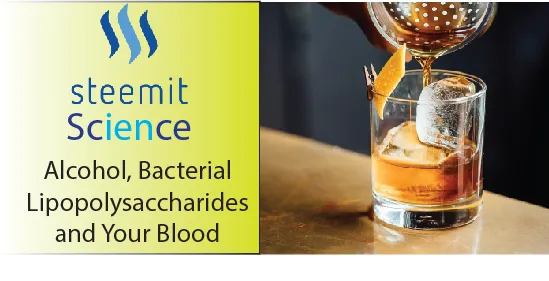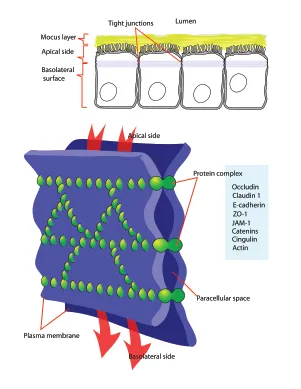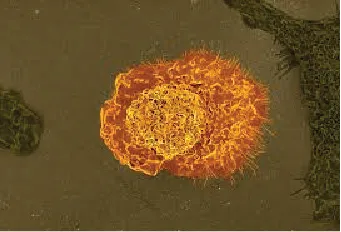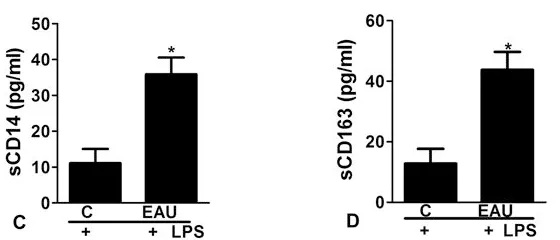The best thing about looking through recent articles published in science journals, is you never know what new, weird topic that you might stumble upon. There is such a wide variety of work being done across the globe, on so many different topics. A lot of this work pertains to aspects of human health (because lets face it, we want to improve our quality of life).
Today let us discuss an article published in Nature: Scientific Reports titled "Quantity of alcohol drinking positively correlates with serum levels of endotoxin and markers of monocyte activation."

Alcohol and Your Intestines
Did you know that when you consume alcohol you make your intestinal walls more permeable? Probably not right? This isn't something that many people think about. However it is true and there are a variety of reasons behind why it happens. There have been more than a few studies on the various effects that alcohol (ethanol) has on our bodies.
One such effect is actually due to gram-negative bacteria in our guts, see when some of these bacteria eat ethanol they produce a metabolic byproduct called acetaldehyde (we also produce this compound in our livers when alcohol is partially oxidized by the enzyme alcohol dehydrogenase).

Well when the bacteria in our guts produce acetaldehyde it has effects on our intestinal cells. One such effect is to alter the region where the cells link to one another (called the tight junction) the alteration is due to increased phosphorylation of protein complexes that hold them together, and results in these tight junctions being more permeable to endotoxins. [2]. What is an endotoxin again?
Endotoxins
Endotoxins are lipopolysaccharide compounds which are present in the cell membranes of gram-negative bacteria. They are not released by these bacteria (IE the bacteria don't secrete them) however they do become free when the bacteria are broken down and their cell membranes degrade.
These compounds are toxic, and we (humans) do have a variety of gram-negative bacteria in our gut microbiomes. However, our intestines block their absorption, well... unless of course we drink a good amount of alcohol and make our intestines more permeable to these compounds (as we discussed happens above). These toxins have a whole host of potential negative effects on our bodies, and are thought to be a key contributor to liver injuries from chronic alcohol consumption [3].

Endotoxins have also been reported to interact with various immune cells such as macrophages, which produce inflammatory compounds called cytokines (which are really just compounds that alert the immune system that it needs to ramp up, there's a foreign invader). This interaction between the macrophage and an endotoxin can disturb the effectiveness of macrophages as one of our first lines of defense. [4].
You may be thinking to yourself, okay so chronic alcohol consumption is bad sure, we know this already! However, the effects of endotoxins are also observed even after just some regular run of the mill college style binge drinking! [4] It's not just a potential occurrence for alcoholics.
So What Were The Researchers Looking At Here?
They were studying the relationships between chronic alcohol consumption, lipopolysaccharide endotoxins and production of these cytokine compounds by the immune cells. They were looking for two cytokines specifically called sCD14 and sCD163, and wanted to know a couple of things.
- Does alcohol consumption make the immune cells more susceptible to producing cytokines when encountering an endotoxin?
- Do the amounts of circulating bacteria change with chronic alcohol use?
- Can any relationship between alcohol consumption and endotoxins be used to quantify the amount of alcohol consumption in the past 30 days?
They were testing both heavy drinkers (the sample size was 97 heavy drinkers) which was classified as someone who has more than 4 alcoholic drinks per day or more than 14 per week for men and more than 3 per day and 7 per week for women. And non heavy drinkers (there were 51 non drinkers in the study).
Results
Cytokine levels in the blood of heavy drinkers are higher than for the non drinkers

In this first piece of data we are looking at the concentrations of the two cytokines (you know the immune system inflammatory compounds we discussed above). They are comparing the level for non drinkers (control) to heavy drinkers (ED), and you can see that for both of the cytokines, the blood levels are much higher for the people who drink a lot.
They also further looked into the data they generated here and found that the concentrations of the cytokines were even higher for heavy drinkers who had recently had a drink when compared to those who had not.
Does Alcohol Make The Immune Cells Produce More Cytokines When Exposed To Endotoxins?

In this experiment, the authors extracted peripheral blood mononuclear cells (many of which are immune cells) from the blood of both the non-drinkers and heavy-drinkers. They then exposed these extracted cells to a lipopolysaccharide endotoxin, and monitored the amount of the cytokines that were produced by the cells. What you can see from the plot to the left is that the cells from the non-drinkers did not produce as much of the inflammatory cytokines as did the heavy drinkers. This indicates that alcohol consumption primes the immune cells to respond to endotoxins and produce more of the inflammation causing cytokines.
Is There A Relationship Between Blood Cytokine Concentration and Number Of Drinks In The Past 30 Days?

So here we are looking at plots of a few things, the first is the amount of endotoxin present in someones blood, plotted against the number of drinks they have had in the past 30 days, there seems to be a pretty strong correlation up to about 400 drinks in a month (holy hell, thats a lot of drinks). Similar correlations can also be seen for the two cytokines with sCD14 looking pretty linear in its relationship, while sCD163 is much more broad, but still shows a clear correlative relationship.
Conclusions/Wrap Up
If you recall, the authors were asking the following questions, which we can now provide some answers to:
- Does alcohol consumption make the immune cells more susceptible to producing cytokines when encountering an endotoxin?
Yes, it appears that the amount of alcohol consumed does make immune cells produce more cytokines upon interacting with an endotoxin.
- Do the amounts of circulating bacteria change with chronic alcohol use?
This was discussed in the paper but I did not point it out because the answer is just nope. There was no difference between heavy drinkers and non-drinkers in the amount of circulating bacteria. There WAS however a huge difference in the amount of circulating endotoxins, just not the whole bacteria.
- Can any relationship between alcohol consumption and endotoxins be used to quantify the amount of alcohol consumption in the past 30 days?
Tentatively it appears that the answer to this is yes, there was a pretty clear correlation reported in this study. However more research is definitely needed prior to application of this as some sort of test of alcohol consumption.
Sources
- https://www.nature.com/articles/s41598-017-04669-7
- https://www.ncbi.nlm.nih.gov/pmc/articles/PMC2614138/
- https://www.ncbi.nlm.nih.gov/pubmed/21920463
- https://www.ncbi.nlm.nih.gov/pubmed/24828436?dopt=Abstract
All Non Cited Images Are From Pixabay.com, Flickr.com or Wikipedia.com And Are Available For Reuse Under Creative Commons Licenses
Any Gifs Are From Giphy.com and Are Also Available for Use Under Creative Commons Licences
If you like this work, please consider giving me a follow: @justtryme90. I am here to help spread scientific knowledge and break down primary publications in such a way so as to cut through the jargon and provide you the main conclusions in short (well compared to the original articles at least!) and easy to read posts.
SteemSTEM
Secondly, please consider supporting the @steemstem project. SteemSTEM is a community driven project which seeks to promote well written/informative Science Technology Engineering and Mathematics postings on Steemit. The project not only curates STEM posts on the platform through both voting and resteeming, but also re-distributes curation rewards as STEEM Power, to members of Steemit's growing scientific/tech community.
To learn more about the project please join us on steemit.chat (https://steemit.chat/channel/steemSTEM), we are always looking for people who want to help increase the quality of STEM (and health) posts on our growing platform, and would love to hear from you!